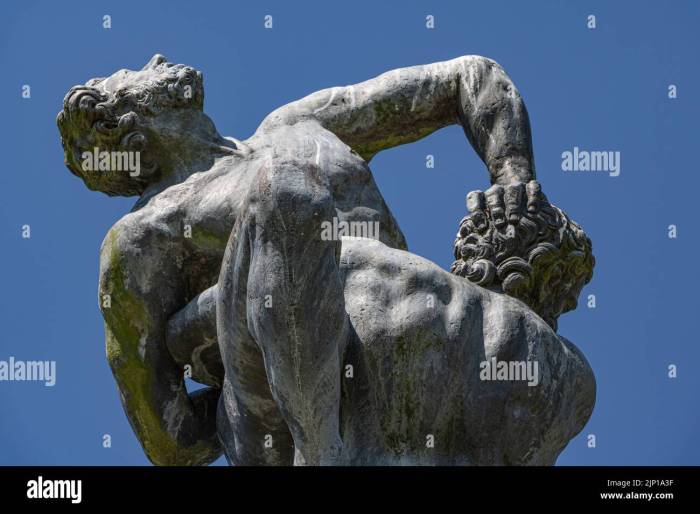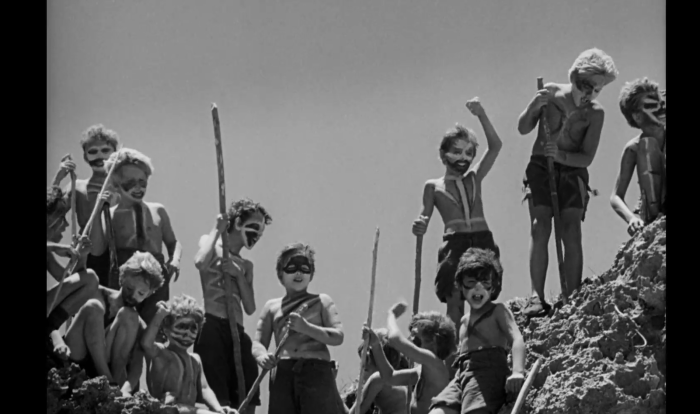Hercules and antaeus fahrenheit 451 – Hercules and Antaeus: Symbolism, Themes, and Allusions in Fahrenheit 451 delves into the captivating narrative of two mythical figures whose encounter in Ray Bradbury’s dystopian novel sparks profound insights into the human condition. This exploration unveils the allegorical meanings embedded within the story, examining its biblical and mythological references, and dissecting the significance of setting and literary techniques.
The story of Hercules and Antaeus in Fahrenheit 451 serves as a microcosm for the broader themes of oppression, rebellion, and the relentless pursuit of freedom. Through the lens of these characters, Bradbury explores the complexities of human nature, the dangers of pride, and the enduring power of hope.
Character Analysis: Hercules And Antaeus Fahrenheit 451
Hercules and Antaeus represent contrasting archetypes in Fahrenheit 451. Hercules, the demigod, symbolizes brute strength and determination. His connection to the gods empowers him with superhuman abilities. In contrast, Antaeus, the giant, represents the primal connection to the earth. His strength derives from his physical contact with the ground.
Motivations and Methods
Hercules’s motivation is to conquer and subjugate Antaeus. He uses his strength and cunning to outmaneuver his opponent. Antaeus, on the other hand, fights for his freedom and the preservation of his connection to the earth. His methods are more defensive, relying on his ability to regain strength from the ground.
Pride and Hubris, Hercules and antaeus fahrenheit 451
Hercules’s pride and hubris lead to his downfall. He underestimates Antaeus’s strength and refuses to recognize his opponent’s connection to the earth. Antaeus, on the other hand, exhibits humility and a deep respect for his surroundings. His awareness of his limitations and the power of the earth ultimately gives him the advantage.
Symbolism and Allusions
The story of Hercules and Antaeus in Fahrenheit 451 is rich in allegorical meanings. It represents the conflict between oppression and rebellion, and the search for freedom.
Biblical and Mythological Allusions
The story draws upon biblical and mythological allusions. Hercules is a figure from Greek mythology known for his strength and battles with monsters. Antaeus is a giant from Greek mythology who was said to be invincible as long as he remained in contact with the earth.
These allusions add depth and resonance to the story.
Significance of the Setting
The setting of the desert is significant. It represents the harsh and unforgiving nature of the world. The lack of resources and the oppressive heat symbolize the challenges faced by those who seek freedom and individuality.
Themes and Connections

The story of Hercules and Antaeus explores several important themes.
Oppression and Rebellion
The story reflects the themes of oppression and rebellion. Antaeus represents those who are oppressed and seek to break free from the constraints imposed by society. Hercules represents the oppressive forces that seek to maintain control.
Search for Freedom
The story also explores the search for freedom. Antaeus’s struggle against Hercules symbolizes the human desire for freedom and individuality. His eventual victory represents the triumph of the human spirit over oppression.
Connections to Other Tales
The story of Hercules and Antaeus shares similarities with other tales of rebellion and the search for freedom. It can be compared to stories such as the myth of Prometheus, the tale of David and Goliath, and the American Revolution.
Literary Techniques

The story of Hercules and Antaeus employs several literary techniques.
Foreshadowing and Symbolism
The story uses foreshadowing and symbolism to hint at the outcome of the conflict. For example, the description of Antaeus’s connection to the earth foreshadows his eventual victory. The use of symbols, such as the sun and the desert, adds depth and meaning to the story.
Narrative Structure and Pacing
The narrative structure of the story is carefully crafted to create a sense of suspense and tension. The story unfolds gradually, with the conflict between Hercules and Antaeus intensifying as the story progresses. The pacing of the story is deliberate, allowing the reader to fully appreciate the characters and their motivations.
Literary Devices
The story employs various literary devices, including metaphors, similes, and personification. These devices enhance the vividness and impact of the story. For example, the description of Antaeus as “a giant of a man” uses personification to emphasize his strength and power.
FAQ Summary
What is the significance of Hercules’s strength in the story?
Hercules’s immense strength symbolizes the power of reason and logic in the face of irrationality and ignorance.
How does Antaeus’s connection to the earth impact the conflict?
Antaeus’s connection to the earth represents the primal instincts and passions that can both empower and enslave individuals.
What is the allegorical meaning behind the story of Hercules and Antaeus?
The story allegorically represents the struggle between civilization and barbarism, as well as the importance of knowledge and enlightenment in overcoming ignorance and oppression.


